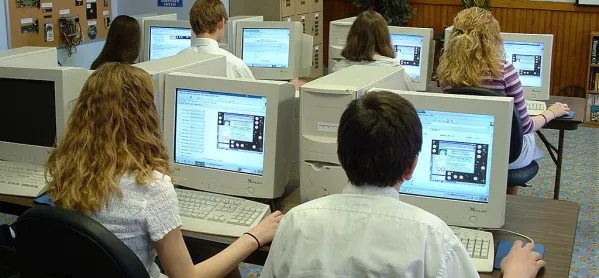Annoying or addictive: how much screen time is too much for your pupils?

It is a situation almost every teacher will recognise: the pupil who is unable to put away their phone, instead surreptitiously texting throughout lessons.
But the line between behaviour which is addictive and behaviour which is just plain annoying is a fine one, according to Mark Griffiths, director of the International Gaming Research Unit at Nottingham Trent University.
In fact, excessive technology use is so widely accepted among teenagers - and their teachers - that, even when it disrupts sleep patterns and schoolwork, it is rarely seen as a problem, Professor Griffiths says.
“If the peer group or school class of the adolescent is pro technology use, actively engaged in technology use and shows signs of problems, it may appear to the adolescent that problems go with the territory,” he writes, in the latest edition of the journal Education and Health.
“Playing the guitar is hard on the fingers, playing football is hard on the shins, and playing video games is hard on sleep and schoolwork. Therefore, it may not be perceived as a medical, psychological or personal problem, but merely as a fact of adolescent life.”
Professor Griffiths has spent years studying the effect of technology addiction on teenagers. He has found that a significant minority experiences severe problems, affecting their education, physical fitness, psychological wellbeing and personal relationships. And yet very few ever seek professional help with their addiction.
Examining why this might be so, he points out that adolescents do not tend to seek medical help for any complaints at all. In particular, teenage boys rarely contemplate seeking treatment for anything “apart from life-threatening traumas and extremely severe acne”.
The reason for this, he says, is that teenagers want to feel that they are able to resolve their own problems, rather than asking a third party for help. But, he adds, it is also attributable to their “perceived invincibility, invulnerability and immortality”, and their belief that “others (usually adults) do not understand them”.
But, Professor Griffiths continues, there is another - very significant - reason that teenagers rarely seek help for screen addictions: it will affect their technology use. “Seeking treatment may signify that they can no longer participate in the activities by which they and their group define themselves,” he writes.
This is compounded by the fact that excessive technology use, in and of itself, is rarely seen as a problem among teenagers: “In most Western societies, problematic technology use is not perceived as a real problem, especially when compared with problems related to alcohol or substance abuse.”
As a result, screen addiction tends only to be treated if - as is often the case - it is linked to other addictive behaviours, such as substance or alcohol abuse. Alternatively, technology addiction may be the symptom of an underlying problem such as depression, lack of purpose, or a dysfunctional family life.
However, Professor Griffiths adds, there may be other explanations as to why so few teenagers seek help for screen addiction. Some, he believes, simply mature out of their problems. Similar examples of spontaneous remission have been recorded in cases of alcohol, heroin and nicotine addictions, as well.
“Adolescence is sometimes about excess, and many addictions peak in youth,” he writes. “They might have an excess flavour-of-the-month syndrome, where one month it is binge alcohol drinking, one month it is joyriding and one month it is video gaming.”
Keep reading for just £1 per month
You've reached your limit of free articles this month. Subscribe for £1 per month for three months and get:
- Unlimited access to all Tes magazine content
- Exclusive subscriber-only stories
- Award-winning email newsletters



